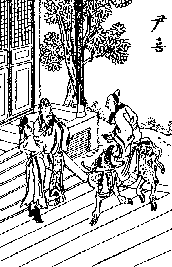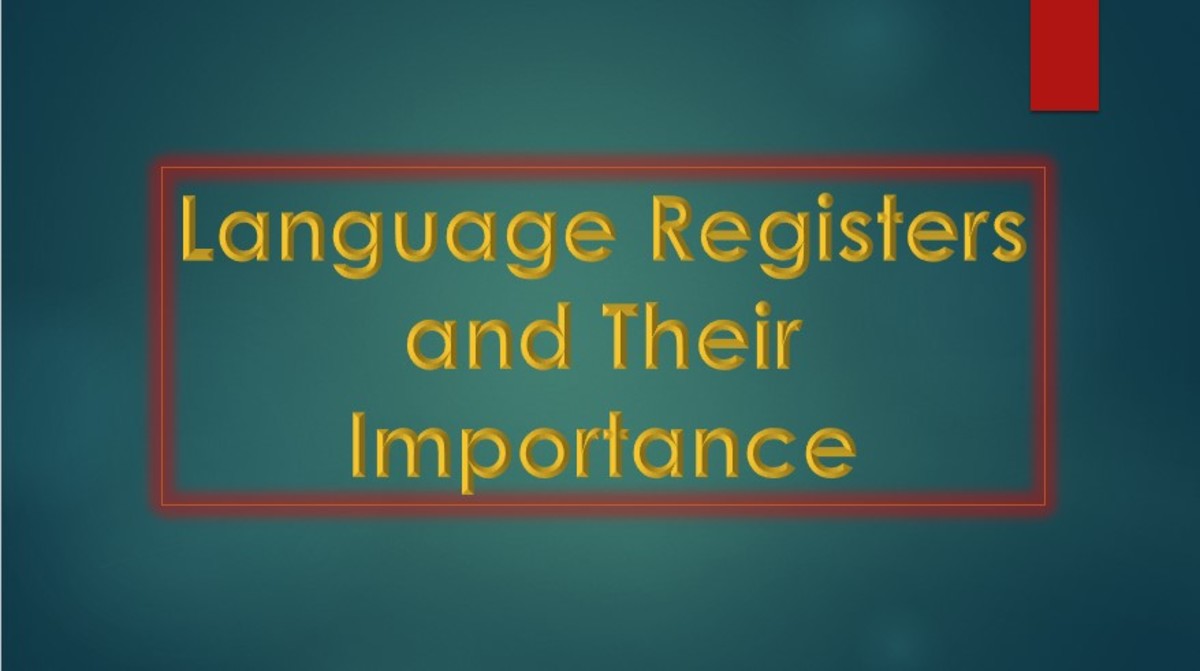How to Get Followers, Disciples and Students: Be a Teacher!
In our lifetime, there are many ways we can make a contribution to our society. We can bring up children, and teach them all we know, and leave behind someone to take our place when we are gone. We can create written and oral texts, sharing our knowledge with others as yet unborn. But who will be there to teach others how to read those texts and who will recite our words to new generations once we are no longer on the scene? For this, we need students who will one day grow up to be teachers. We need disciples and followers, who will one day have followers of their own. And what better place to get followers, than on Hubpages? (Smile.)
Reciprocal and non-reciprocal relationships
At the moment, I have eight hundred followers. A couple of days ago, I had eight hundred and one. The number of followers that I have on Hubpages fluctuates, sometimes rising, sometimes falling. Typically, I lose two fans for every four I gain. Sometimes, if I say something really unpopular in the Forums, more people stop following than join me that week.
One of the reasons that I don't have more people following me is that I don't always reciprocate. To some, reciprocity is the name of the game. But I think reciprocity is highly overrated. People should follow other people if they want to read what they write. Any other considerations are beside the point. Becoming a follower is just choosing to be a regular reader. It's like signing up for a subscription. That's what a follower is: a subscriber. No, you don't have to read every hub I write, just because you subscribed, but what is the point of the subscription, if you don't read any of them?
And yet, looking over the statistics, I see that I have more followers than readers on Hubpages. And I have more readers in the world at large than hubbers, but those are people who buy things, and they are not my intellectual heirs. The Google traffic means money. They are like people making a donation to my educational fund. Hubpages traffic means readers. They are like people auditing a course, but not committing to be tested at the end. Neither sort of traffic, so far, has netted me any students. Students are people committed to learning the material.
When I first started writing on Hubpages about two and a half years ago, our subscribers weren't called followers. They were called fans. This signaled to discerning readers that the relationship was not meant to be reciprocal.
As Marisa Wright used to explain it, "If you are a fan of Beyonce, does this mean that Beyonce is a fan of yours?" While it is not as clear to some people now that they are called "followers", the analogy should be a similar one. If you are a follower of the Hari Krishna, does this mean that Hari Krishna is one of your followers? Probably not. If you are a worshipper of Allah, does this mean Allah worships you? If you are a disciple of Christ, does this mean Christ is one of your disciples? If you are a student of Lao Tzu, does this mean that Lao Tzu is one of your students?
You get the picture. Some relationships tend to be more reciprocal than others. If someone is your spouse, then you are their spouse. If someone is your sibling, you are their sibling. If someone is your classmate, you are their classmate. If someone is your peer, then you are automatically their peer. That's because these relationships are defined that way.
Other relationships are hierarchical and non-reciprocal by definition. If someone is your parent, then you are definitely not their parent. If someone is your teacher, then you are probably not their teacher, although it's not impossible. Of course, two people can learn from each other, but usually not the same subject. So if someone is your math teacher, it is very unlikely that you are their math teacher. If you are, then it probably means that each of you is an expert in a different branch of mathematics.
Many people think that friendship is one of those relationships that are reciprocal by definition. "You have to be a friend to have a friend." In my experience, that's not actually true. Some friendships are more one sided than others. To be a friend, you have to really like someone and want to be there for them. For them to be your friend, they have to feel the same way. Sometimes they do. Sometimes they don't. If you are not a very petty person, you don't insist on absolute quid pro quo, because you value other people for who they are and what you have to learn from them, and not for how they feel about you.
Some friendships are mutual, of course. But those are the rare ones, where each friend has as much to teach as he does to learn, as much to give as he needs to take. Mutual admiration societies -- genuine ones -- are hard to find.
I am sometimes a friend to people who are not my friends. I sometimes admire those who do not admire me. And I have been a teacher, and when I serve in that capacity, even though I may learn many things from my students, they learn even more from me.
Lately, one of the things I have missed most about being outside the academic establishment is the opportunity to teach.
To be a True Disciple, One Must Be Worthy

What is a teacher?
In Taiwan, they have a special holiday called "Teacher's Day". They take it very seriously. I used to receive cards and gifts from my students on Teacher's Day. Even though it has been about ten years since I last taught there, I still occasionally receive a friendly email from a former student on Teacher's Day. And they never seem to think of themselves as "former student", either! They always say, "remember me? I am your student." I like the way that sounds.
I remember being told, when I was in Taiwan, that teachers should be respected, because they are the ones who bring knowledge to the people. Teachers were always spoken of as if they were are in direct line of succession from Confucius.
But actually, there are two distinct and separate concepts that are being conflated under the term "teacher". There are those who teach the world new things that the world never knew before, and they are called teachers, but they are really, first and foremost, thinkers. Then there is the other kind, whose job it is to pass down all the knowledge that has already been accumulated by their society collectively, but not to add to that knowledge. These people are also called teachers, but they are really, first and foremost, preceptors.
Grad Students, Interns and Disciples
Usually when we teach undergraduates, we are acting as preceptors, teaching them things that "everybody" already knows, and catching them up to the current state of knowledge. Graduate students, on the other hand, are people whose thinking we help guide while they discover something new.
In both cases, a good teacher doesn't just teach what. A good teacher teaches why, and the why is more important than the what. It is more important to understand how we arrive at a conclusion than to know the conclusion. Tomorrow, we may discover that we were wrong about one of our conclusions, but if a student learns how to reason for himself, that will always stand him in good stead. That is why learning is more important than studying.
Working with graduate students is especially exciting, because they are in the process of learning something that we ourselves as yet do not know. So if there is ever a relationship between a teacher and a student that is close to mutual, it is this one. But still, in order to be a good teacher, the professor must do more than stand back and watch. Having the right professor on your committee can make the difference between failure and success.
The Project Bow Internships
When I started Project Bow, I intended to follow in the best tradition of academic excellence, including having students to help with my work and to move it forward. It was my plan for this project to last more than one lifetime, and I was hoping that more than one generation of chimpanzees and more than one generation of humans would help to keep it going.
At first, I invited some of my former students to be part of the project. I was hoping that Chinese would be one of the languages that Bow would be fluent in, but soon the students from Taiwan who were able to devote themselves to this endeavor ran out, and we had to drop Chinese as one of the test languages. I was also hoping that I would be able to recruit students from Israel to be involved, but to date, after ten years, there has yet to be a single Israeli intern.
I have had interns from India, the United Kingdom, the United States and Canada. I'm not able to offer a stipend, but I can give room and board. I have had some very fine volunteers who have made meaningful contributions to the project, but somehow, the three month and four month periods of their stays have been too short to produce dissertations and publications.
It has occurred to me recently that it is not enough to do the research and publish about it. I need students who will carry on my work long after I am gone. But accomplishing this without institutional affiliation can be a tricky matter.
What I have to Offer Students
Here is how it works in the academic world. Grad students receive a stipend that allows them to study without working. They receive tuition remission. They put certain professors on their committee, and these teachers help guide them while they do original research.
How can I compete with that? I have no stipend to offer. I do not have institutional affiliation. I cannot issue academic degrees. But I do have a chimpanzee, and an ongoing ape language project. That is what most primatologists and other academicians teaching at universities are missing at the moment. Chimpanzees have been banished from university campuses throughout the United States and Canada. This means that graduate students working on degrees in anthropology, linguistics, psychology, biology and related disciplines who want to become primatologists have no chimpanzees or other great apes to work with. Yes, you can get a degree in those disciplines. But if you want to discover something new, how are you going to do that?
Here's my pitch to grad students who are already enrolled in a program: "Put me on your committee. Come work with Bow. The institution where you are a grad student will award you your advanced degree. But I will see to it that you have some actual research to present. If this seems like a good deal to you, contact me."
Students who have not yet entered grad school, but are considering it, can contact me for pre-admission mentoring. I can help them get in. I can help them choose a department that is right for them. Once they're in, if they want their research to involve ape language studies, they should spend every summer here, volunteering for Project Bow. Once they are finished with their required coursework, I can help them prepare a dissertation proposal on some aspect of Bow's language development. While I am not going to be their official thesis advisor, I can be a member of their committee, and I can offer real help with their research.
Conclusion: How You Can Be a Teacher
If you have some special knowledge to share with the world, writing and publishing are both essential activities, but they are not enough. There is no reason to assume that our books and articles will continue to be read long after we are dead, unless there are others who understand them and have an inner need to share their significance with future generations yet unborn. To have followers, (real followers, not the kind we have on Hubpages), you have to be a teacher.
Do you have something to teach? If you do, consider recruiting your students online. You can offer lessons face to face on Skype, or you can enroll with one of the services listed here. Teaching is not only rewarding in and of itself. It is also a way to spread your point of view.
Teaching is not a substitute for research and publishing, but the two go hand in hand, and both are good ways to make a lasting contribution to the world we live in and its current state of knowledge.
(c) 2010 Aya Katz
Related Hubs
- How You Can Help Project Bow
Project Bow is a privately owned research endeavor with a shoestring budget. No government funding has gone into supporting Project Bow, and none ever will. While we don't make a profit, we are not a "not for... - Profile in Primatology: Sally Boysen
Sally Boysen is a tenured professor of psychology at the The Ohio State University. She specializes in numerical abilities of non-humans. She has published countless scholarly articles on this subject and is... - Primatology
As a child, I had a number of ambitions. One of them was to cross-foster a chimpanzee in a human household, along with a child of my own, and to enable him to learn language and acquire literacy. It took many...








